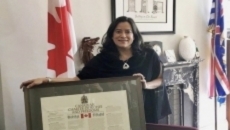VANCOUVER - Poultry farmers in British Columbia are under pressure to protect their flocks as a highly contagious strain of avian flu sweeps over North America.
Ray Nickel, spokesman for the B.C. Poultry Association Emergency Operations Centre, says they’ll use the lessons learned to prevent infections after two severe outbreaks since 2004 that forced them to cull millions of birds.
The H5N1 strain of avian flu is highly pathogenic and can cause serious disease and death in birds, says the Canadian Food Inspection Agency.
Nickel, a commercial poultry farmer in Abbotsford and member of the BC Chicken Marketing Board, said farmers are worried aftera case of avian flu was confirmed on a North Okanagan farm last week.
"It's so virulent, and there's a degree of concern that we have for our animals because the impact is so severe," he said. "I feel for my peers in the other provinces that are experiencing it in a more significant way than we are at this point, but it does elicit an amount of fear in us that just isn't very comfortable."
Outbreaks of the same strain have also been detected in Newfoundland and Labrador, Nova Scotia, Ontario, Saskatchewan and Alberta.
The Canadian Food Inspection Agency said last week this has been an unprecedented year globally for avian flu.It said it believes migratory birds are responsible for the outbreaks, and expects there will be more cases as flocks continue to fly north for the summer.
Previous outbreaks in B.C. and elsewhere in Canada led to the destruction of millions of birds. The most serious was a 2004 outbreak in the Fraser Valley, where the H7N3 strainspread to 42 commercial farms and 11 backyard coops, prompting federal officials to order a cull of about 17 million birds.
Nickel said B.C. operations are uniquely equipped to respond to potential outbreaks because of their past experiences.
“We know what it looks like. The good part is knowing what to expect, but on the other hand, nobody wants to go through this."
The B.C. Egg Marketing Board said there are 578 poultry farms in the province and about 80 per cent of those are located in the Fraser Valley, which sits in the path of Pacific Flyway, a main bird migration route.
Because B.C.'s industry is concentrated in the Fraser Valley, Nickel said farmers need to take on more responsibility to prevent the spread of the flu.
Avian flu is spread through contact with an infected bird or its feces or nasal secretions. Farm birds that go outside are most at risk because they can come in direct contact with infected wild birds or their feces. Humans can also inadvertently carry the infection into a barn on their shoes or clothing.
Nickel said biosecurity and emergency management measures introduced after the 2004 outbreak helped to control the spread of the virus in 2009 and 2014. Each outbreak has allowed the province and its farmers to improve and refine its response, he said.
The association has an emergency response team that operates using an incident command structure, similar to fire and police services, allowing the team to respond quickly when flu is found, he said. Protocols include strict procedures around locked gates, changing clothing and footwear, and monitoring entrances and exits.
"It’s a very regimented procedure that takes place," he said. "B.C. is the only province that has a mandatory biosecurity program provincially. Everyone across the country has biosecurity measures that they put in place, but because of 2004, B.C. developed a mandatory provincial one that is enforced by the marketing board.”
When Agriculture Minister Lana Popham announced the discovery of avian flu in the Okanagan farm last week, she said the Canadian Food Inspection Agency was leading the response to the outbreak, which includes testing, mapping, surveillance and disposal of animals.
“All poultry producers, including backyard poultry owners, are advised to increase their biosecurity practices and to be vigilant and monitor for signs of avian influenza in their flocks," she said.
B.C.'s deputy chief veterinarian also issued an order requiring all commercial poultry flocks in the province with more than 100 birds to be moved indoors until the spring migration ends in May, the Agriculture Ministry said.
The order said the H5N1 strain of avian influenza was detected in wild birds around Metro Vancouver earlier this year and because waterfowl are considered the main source of the virus, steps must be taken to limit their exposure to commercial poultry.
Agriculture and Agri-Food Canada said the food industry is making adjustments to maintain supplies of poultry and eggs in the face of a large outbreak.
The CFIA said no human cases have been detected in Canada and the illness is not considered a significant health concern for healthy people who are not in regular contact with infected birds.






